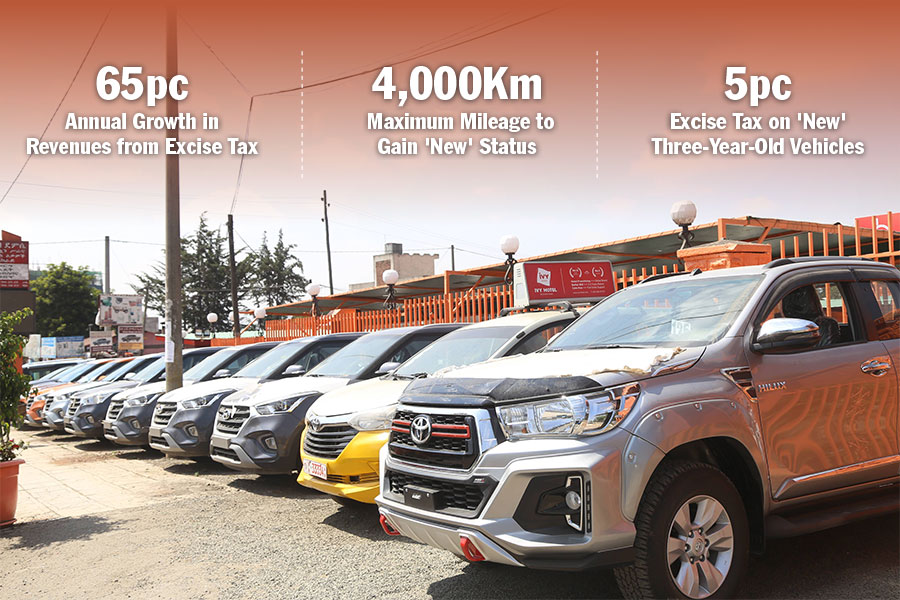
Sunday with Eden | Sep 28,2019
Jan 7 , 2023
By Eden Sahle
During the era of Emperor Haile Selassie's coup d'etat attempt, history gives it that the palace vehicle drove around the capital city, publicly announcing that the emperor had been removed from power.
The public went to the capital and joyfully welcomed the announcement, bowing down and cheering as a crowd. A few hours later, the attempt failed, and the same vehicle made a public announcement, this time declaring the emperor had been reinstated. The public then went to the street, cheering with great joy.
Our history is fitting to explain the incomprehensible act of the public in each generation. Today we chuckle at the same problem our forefathers experienced. Going with the flow despite consequences became a cornerstone of our culture. Time has not resolved the confusion about politics, society, and development. Often the new has become the old, and the old reflects in the new.
In the 21st century, we still find ourselves in the grips of collective uninformed public action being aggravated by social media and its global reach. The public is keen to join a popular trend online and offline instead of examining the situation.
It has been seen in public gatherings and social media platforms that some put forth generalized and factually wrong opinions without any remorse for the negative backdrop. Most people do not give emphasis to their messages and the potentially damaging consequences. The ones at the receiving end also tend to believe opinions and assumptions without verification or further examination.
A diaspora friend of mine from school days has never cared to learn about real happenings in politics and economics. She asked about the viral remark of people on social media during one of our occasional conversations a couple of years ago. I informed her about the war in the northern part of the country and the unrest that had taken place in cities. On the same day, my friend shared a post that could be considered violent on her social media page and opinions for the first time. Her response when I confronted her was "we shall follow the voice of the crowd."
She continued the hate speech and violent posts that fit the narratives of the side she thought was worth "following".
When the long-awaited peace embraced the country and political leaders sat together to resolve differences, my friend that had instigated violence and hate joined another crowd that sang a peace song.
Social media and public gatherings are verbal punching grounds for political, social, and economic ills. People spend most of their time socialising and validating each other based on shared assumptions. All it takes is to discover what the majority are saying and amplify that crusade intensely as their own long-built belief. They are not bothered by how their actions affect others. Some become part of the crowd to keep their social acceptance and share information because it earns them approval and followers. They made political extremism the rule instead of the exception.
Such wrongful populist movements increase the number of conspiracy theories and misinformation, heavily dividing the nation and keeping people engaged in meaningless hateful arguments. Considering our massive socio-political discourse, a public contribution cannot be neglected. The country's troubles are stubborn and inherent, rooted in political polarization and populism. How we tend to repeat history shows how much we have not learned from the past.
The politics and the social fabric opt for assumptions instead of asking questions. Uninformed radicals and doomsayers disproportionately influence communities developing extreme and irrational levels of pessimism. Time did not make us any better than those who lived before us. The preexisting poor public awareness made the public fall for spectrums of extremes keeping the sad history alive.
Until we all recognise the generational mistakes and act moderately about politics and society, history will continue to repeat itself.
Following the crowd is part of our history. We shall challenge the status quo and promote a new healthy culture that shifts attitudes from hasty generalised assumptions to the truth.
PUBLISHED ON
Jan 07,2023 [ VOL
23 , NO
1184]

Sunday with Eden | Sep 28,2019

Fortune News | Jan 12,2019

Viewpoints | Nov 04,2023

Sunday with Eden | Jan 31,2021

Fortune News | Jan 05,2020

Commentaries | Aug 10,2019

Fortune News | Jul 24,2021

Radar | Jan 25,2020

Fortune News | Jul 31,2021

Viewpoints | Jan 09,2021

Photo Gallery | 154173 Views | May 06,2019

Photo Gallery | 144424 Views | Apr 26,2019

My Opinion | 134928 Views | Aug 14,2021

Photo Gallery | 132710 Views | Oct 06,2021

Dec 22 , 2024 . By TIZITA SHEWAFERAW
Charged with transforming colossal state-owned enterprises into modern and competitiv...

Aug 18 , 2024 . By AKSAH ITALO
Although predictable Yonas Zerihun's job in the ride-hailing service is not immune to...

Jul 28 , 2024 . By TIZITA SHEWAFERAW
Unhabitual, perhaps too many, Samuel Gebreyohannes, 38, used to occasionally enjoy a couple of beers at breakfast. However, he recently swit...

Jul 13 , 2024 . By AKSAH ITALO
Investors who rely on tractors, trucks, and field vehicles for commuting, transporting commodities, and f...

Sep 6 , 2025
The dawn of a new year is more than a simple turning of the calendar. It is a moment...

Aug 30 , 2025
For Germans, Otto von Bismarck is first remembered as the architect of a unified nati...

Aug 23 , 2025
Banks have a new obsession. After decades chasing deposits and, more recently, digita...

Aug 16 , 2025
A decade ago, a case in the United States (US) jolted Wall Street. An ambulance opera...

Sep 7 , 2025 . By NAHOM AYELE
Addis Abeba's sixth public land lease auctions after a five-year pause delivered mixe...

Sep 7 , 2025 . By BEZAWIT HULUAGER
Brook Taye (PhD), the chief executive of the Ethiopian Investment Holdings (EIH), is...

Sep 7 , 2025 . By BEZAWIT HULUAGER
For decades, Shemiz Tera in the Addis Ketema District of Atena tera has been a thrivi...

Sep 7 , 2025 . By NAHOM AYELE
A dream of affordable homeownership has dissolved into a courtroom showdown for hundr...